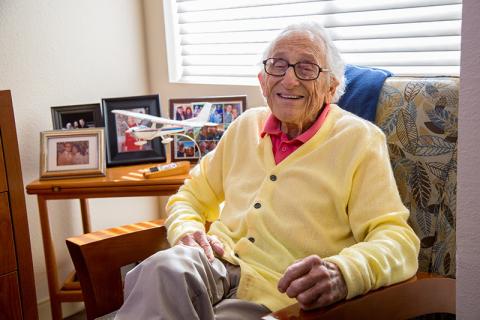Howard F. Marx: Father of GPS
It was 1945, and the war in Europe was winding down. Hitler’s forces had collapsed, and all thoughts were turning to the Pacific. Back in the Caribbean, a young naval engineer and Tulane graduate from Monroe, Louisiana, was onboard the aircraft carrier USS Kearsarge, bound for the Panama Canal.
“Our orders were to rendezvous with the Pacific fleet,” Howard F. Marx (E ’43) recalls. “The only problem was, the war ended before we got there.”
Celebrating all the way home, the crew prepared to return to civilian life. For Marx, it was an auspicious start to an extraordinary career, one that would span over 50 years of aeronautic engineering and design.
Marx’s interest in aircraft began during his sophomore year at Tulane, when he learned to fly over summer break. After the war and graduate work, he joined Convair, a firm that produced numerous aircraft for the American military, including the enormous, 10-engine B-36D long-range bomber.
Ship captains and pilots alike know the challenges of navigation, especially for long distances, a topic that had long fascinated Marx. As he describes it, traditional navigational instrumentation was a mixture of the mechanical (i.e. astrolabes and sextants), the celestial (i.e., Venus and Polaris) and the intestinal (i.e., guts).
For Marx, the challenges were irresistible. Observing the development of gyroscopes and signal transmitters in the 1960s, he envisioned sending these devices into stable orbit, and thus calculating global location with greater accuracy. It was the birth of what we now know as GPS.
Now retired, Marx, 94, has hung up his own wings, but his lifetime fascination remains. Recently, over “10 years of Saturday mornings,” he and other enthusiasts built a working replica of the Wright brothers’ first aircraft, an invention that he calls nothing less than “a cotton-picking miracle.”
From this decorated pilot and engineer, that’s high praise indeed.
This story originally appeared in the March 2017 issue of Tulane magazine.

